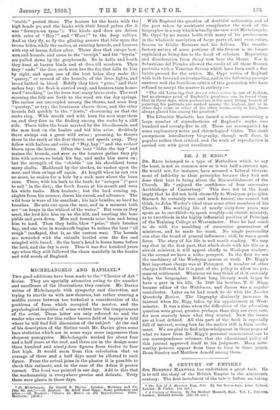DR. J. H. RIGG.*
DR. RICA belonged to a type of Methodism which, to say the least, is not as common now as it was half-a-century ago. He would not, for instance, have accused a Liberal Govern- ment of infidelity to their principles because they had not done their best to bring about the Disestablishment of the Church. He " enjoyed the confidence of four successive Archbishops of Canterbury." This does not in the least imply that he did not hold staunchly to Wesleyan principles. Staunch he certainly was, and much nearer, one cannot but think, to John Wesley's ideal than some other members of his Church. His working life of nearly sixty-four years was spent as to one-third—to speak roughly—in circuit ministry, as to two-thirds in the highly influential position of Principal of the Training College at Westminster. Here he had much to do with the moulding of successive generations of ministers, and he made his mark. No single personality can alter the trend of general influences ; still, he was a great force. The story of his life is well worth reading. We may say that in the first part, that which. deals with his life as a circuit minister, it will appeal chiefly to Wesleyan readers ; in the second we have a wider prospect. In the first we see the machinery of the Wesleyan system at work. Dr. Rigg's first important charge was at Penzance. A number of other charges followed, for it is part of the policy to allow no per- manent settlement. Whatever we may think of it, it certainly helps the biographer. Before long literary work began to have a part in his life. In 1849 his brother, T. C. Rigg, became editor of the Watchman, and James was a regular contributor. Later on he had much to do with the London Quarterly Review. The biography distinctly increases in interest when Dr. Rigg takes up his appointment at West- minster. It was a time when the difficulties of the education question were great, greater, perhaps, than they are even now, for men scarcely knew what they wanted.• Now the issues are at least defined. All this part of the book is especially full of interest, seeing how far the matter still is from settle- ment. We are glad to find acknowledgment in these pages of what we knew from Dr. Rigg's personal communications to our correspondence columns, that the educational policy of this journal approved itself to his judgment. Many note- worthy persons appear from time to time in these pages, Dean Stanley and Matthew Arnold among them.






































 Previous page
Previous page